Where's Your Demand To Free The Hostages?
On the double standard that poisoned the discourse, Israel's plan to occupy Gaza, and open season in the West Bank
Quick editor’s note for new readers: I aim to send this out every Saturday or Sunday. It opens with a short reflection on what’s been on my mind, followed by a weekly news roundup organized by region—Gaza, the West Bank, Israel, the US, and occasionally elsewhere. The stories come from American, Arab, Israeli, and European outlets, as well as firsthand testimony, with links to the sources provided throughout, along with my own reporting.
I keep coming back to the grotesque double standard in media coverage of “Israeli hostages” versus “Palestinian prisoners,” because I’m convinced it played a central role in poisoning the discourse from October 7 onward. It’s something you should be able to recognize regardless of your politics or your degree of sympathy for the Israeli captives in Gaza.
Here’s what I wrote in June:
One of the great failures of the press over the past 19 months has been its near-total silence on the 10,000+ Palestinian prisoners held by Israel—men, women, children, the elderly, thousands detained without charge, many for nothing more than a Facebook post or a civil service job in Gaza. Some are quite literally hostages, imprisoned until a family member turns themselves in.
These prisoners are held in what the Israeli human rights group B’Tselem calls a “network of torture camps”… Dozens of Palestinians have died in Israeli custody since October 7. Top brass reportedly call the Sde Teiman prison a “cemetery.” Countless have been starved, tortured, electrocuted, attacked by dogs, sexually assaulted, denied medical care, and left to rot in their own shit and piss. A growing number have had their limbs forcibly amputated, often without anesthesia, after zip ties cut off their circulation.
The erasure of this reality helped birth the era’s most hollow moral litmus test: whether every call to “free Palestine” or even “end the war” is accompanied by a demand to “free the hostages.” All this doesn’t even account for the fact that Israeli military operations have reportedly killed at least 20 hostages, and most of their families believe the government abandoned them long ago.
The irony, of course, is that this demand is itself a declaration that some lives are worth more than others—specifically, that Jewish lives, or more accurately, Jewish feelings of safety, matter more than Palestinian lives.
But it’s precisely this refusal to reckon with asymmetry that has plunged us into a discursive death spiral, where calls to free Palestine are treated as, at best, callous, and at worst, a tacit endorsement of Jewish genocide.
It’s been top of mind for me again as the videos of the emaciated Israeli hostages circulate widely—including on a Times Square billboard, where the Israeli consul general launched a campaign under the slogan: “This is what real hunger looks like.” (Emphasis mine.)
To be clear, on a human level, I feel deep sympathy for the Israeli hostages and their families, who are clearly suffering immensely. Nobody should ever be forced to dig their own grave. I hope they make it home safely, and I have bottomless contempt for Netanyahu for sabotaging multiple hostage deals in favor of committing genocide.
But I do not feel more sympathy for the Israeli hostages, much less the POWs, than I do for the thousands of Palestinians rotting away in Israeli dungeons. Take Dr. Hussam Abu Safiya, the pediatrician, hospital chief, and human rights defender from Gaza who has spent the past eight months in military detention under Israel’s Unlawful Combatants Law. The law lets Israel imprison people from Gaza indefinitely without charge or trial, on secret evidence they can’t challenge, while cutting them off from lawyers and family for months at a time. No due process, no habeas corpus. His lawyer says he’s lost forty percent of his bodyweight and is in dire health from routine abuse, starvation, and medical neglect. Last December, Dr. Abu Safiya wrote an op-ed for The New York Times, “begging the world for help” as Gaza’s hospital system was collapsing under Israel’s relentless bombardment. He was arrested weeks later—possibly in retaliation for the piece—and the Times waited 11 days to note his detention in an article about Israel’s baseless claim that Hamas operated out of his hospital. (In fairness, the article noted that Israel offered no evidence to back its spurious claim.) His name hasn’t appeared there since.
Or 16-year-old Palestinian American Mohammed Zaher Ibrahim—one of hundreds of Palestinian children in Israeli military detention—who’s been imprisoned since February, after Israeli soldiers surrounded his house, blindfolded and zip-tied him, and hauled him off for interrogation before transferring him to the notoriously brutal Megiddo prison. He’s facing a potential 30–36 month sentence on stone-throwing charges, with three delayed court dates and no trial currently scheduled. He has lost 26 pounds, is covered in scabies, and is barred from speaking with his family, who have only seen him on security footage. I spoke to his uncle today, who said Mohammed’s older brother, waiting in the courthouse for a glimpse of him on CCTV, nearly fainted at the sight of his sunken face and the way he lifted his arms to show the parasites burrowed under his skin. He turned 16 in prison, the age when he’d planned to be in Florida getting his driver’s permit and working in his family’s ice cream shop with his first cousin Saif, who was beaten to death by settlers last month. Until a July 31 Guardian story, the Western press had never mentioned his name, and since then, not a single major American outlet has covered it, despite his family’s desperate pleas for help.
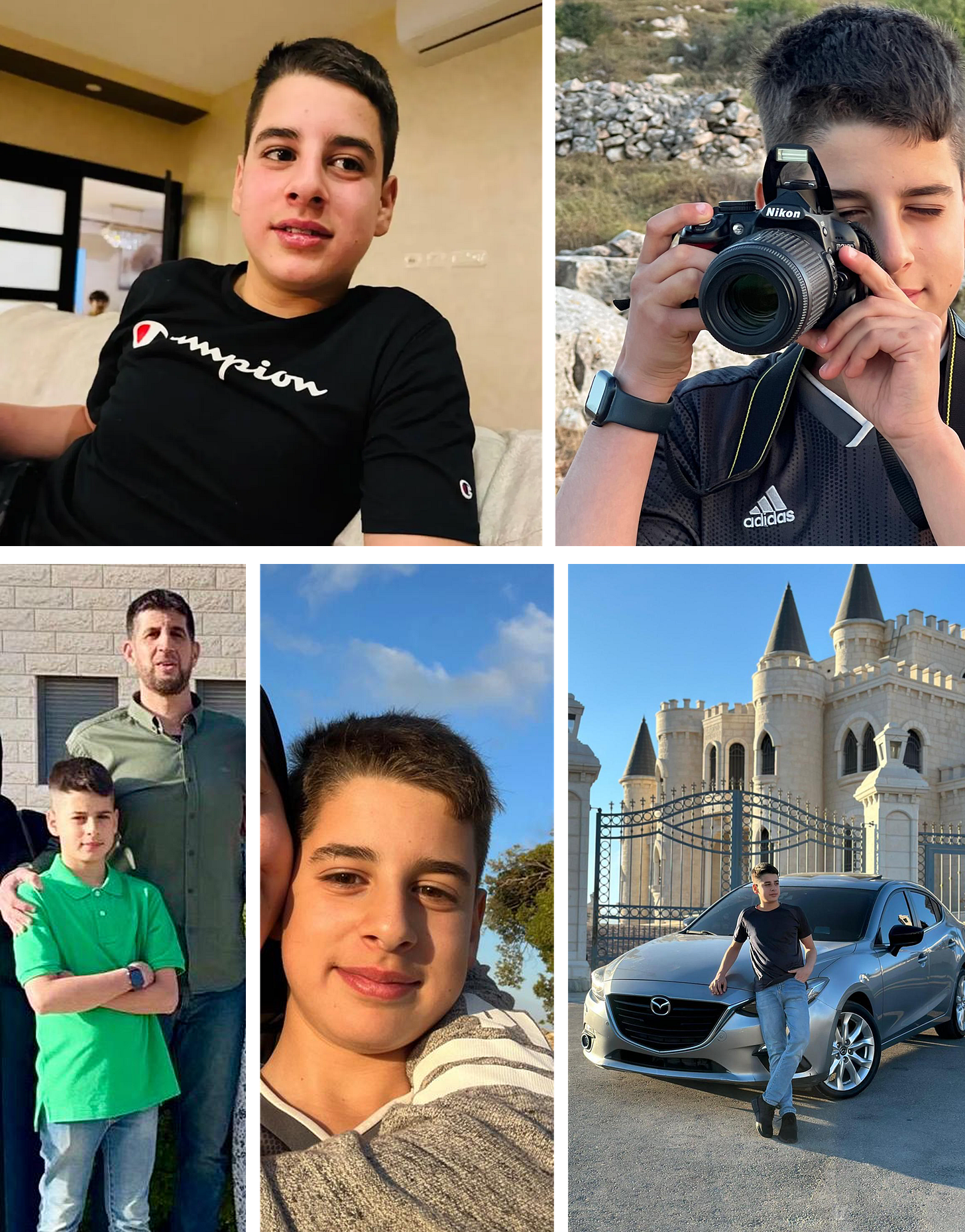
The reflexive assumption that Gaza’s tunnels must be scarier than Israeli prisons—an idea I believe is rooted in racism, and one that ignores the fact that numerous freed hostages said they feared Israeli airstrikes more than anything else—might be challenged if the media actually covered what happens inside those prisons.
This past week, 20-year-old Ahmed Saeed Tazazeh from Jenin died in Megiddo prison after three months in administrative detention—a policy that, like the law holding Dr. Abu Safiya, allows Israel to imprison people without charge or trial on secret evidence they can’t challenge. Israeli authorities provided no explanation for why a healthy young man suddenly dropped dead, just as they’ve failed to explain the deaths of 75 other Palestinians in Israeli custody since October 7—all but three of whose bodies the state is still holding through its policy of postmortem detention. Has anybody seen this covered by the Western press?
Or what about the death of a detainee who “fell from a significant height” while handcuffed inside a Shin Bet facility—a cause of death that hardly requires much imagination to interpret. Or the 30-year-old who died of cancer months after his release from administrative detention, where he was beaten, neglected, and denied medical treatment until he was terminally ill. Did either of these make the news?
Travel through the West Bank and you’ll meet countless people who’ve lost relatives to Israeli prisons or served time themselves, each with their own horror stories. Like Mofeed Shihab, whom I met in Sebastia, whose left leg was amputated after he was shot by soldiers as a child. When he was later arrested at a protest over settlers dumping sewage on the town’s farmland and accused of throwing stones, the judge pointed to his maimed body as proof he was predisposed to violence. In prison, guards confiscated his prosthetic and forced him to crawl on the floor for their amusement.

But the double standard extends far beyond simply covering the captives themselves. Take this tweet, for example, which was viewed over half a million times:
Putting aside the fact that there is no such thing as safe passage for aid workers in Gaza—just a few months ago, Israel executed and buried 15 of them, including at least one who was still alive before he was tossed in the mass grave—how many people are aware that Israel has blocked Red Cross visits to Palestinian prisoners since October 7? This, along with Israel’s refusal to share information about its captives, is in direct violation of international law.
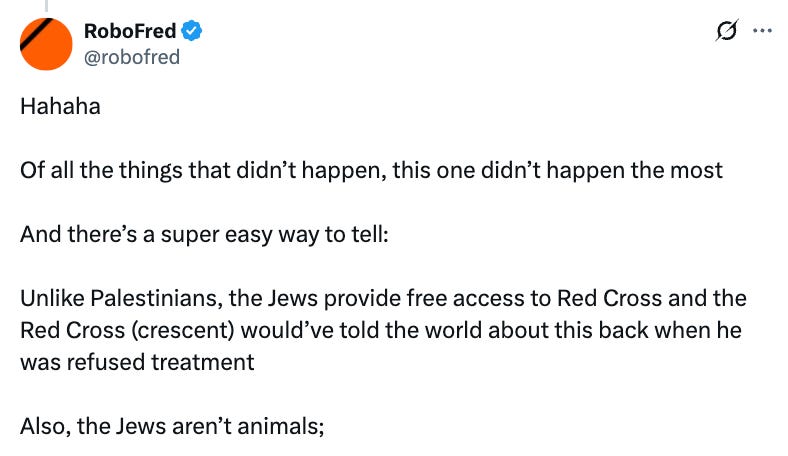
On Wednesday, the state asked the High Court for its 20th delay in responding to a petition demanding Red Cross access, citing only vague “national security” concerns. What possible reason could there be other than an attempt to cover up systematic violations of prisoners’ rights? Why isn’t this a bigger story?
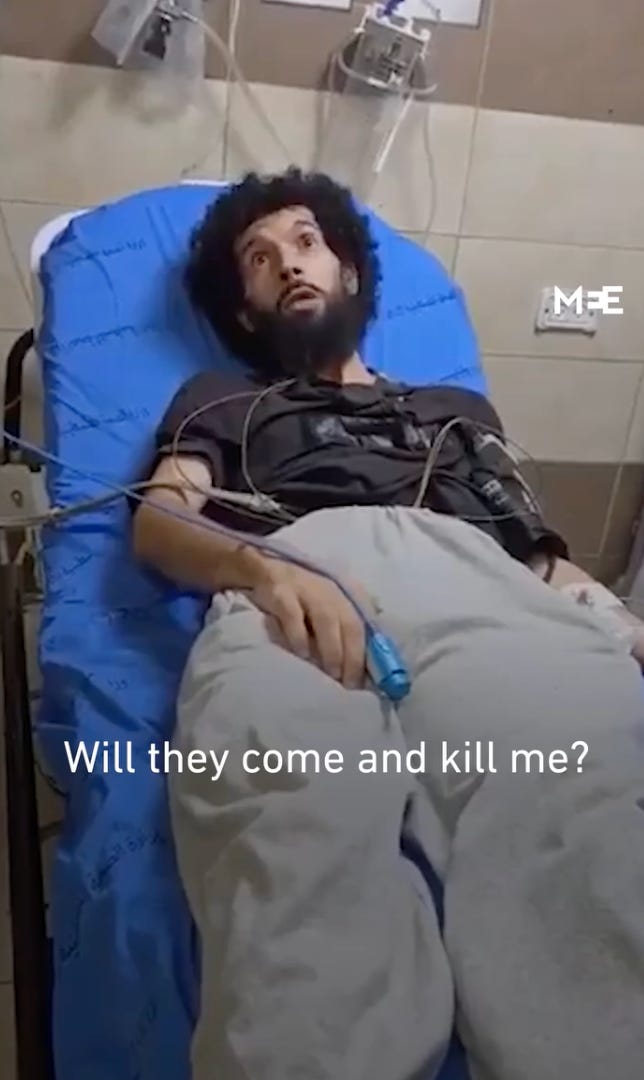
Hamas, for its part, says it will allow Red Cross access to the hostages if Israel permanently opens humanitarian corridors and halts airstrikes during aid distribution. The group also claims it is not deliberately starving hostages, only that they face the same famine as the rest of Gaza. Whether or not you believe that, it seems somewhat newsworthy that Israel’s National Security Minister, Itamar Ben-Gvir, has openly boasted about starving Palestinian prisoners, worsening their conditions, and pushing to legalize “putting a bullet in their head.” He’s even defended the right of Israeli prison guards to rape and abuse detainees. And this is not just some extremist spouting off—Ben-Gvir quite literally oversees the Israeli prison system.
In the weeks after October 7, one of the main sources of outrage among Israel’s supporters in the U.S. was the tearing down of hostage posters, seen by many as a complete dehumanization of Israelis and a dismissal of their suffering. But I don’t think that’s what it was about. I initially had a visceral reaction myself, but came to see the act as born of an accumulated righteous fury—like what James Baldwin wrote in Notes of a Native Son, that there is “no Negro living in America who has not felt, briefly or for long periods, with anguish sharp or dull,” a desire to bring white people “as low as that dust into which he himself has been and is being trampled.”
As the costs of Israel’s forever war on Palestine came home, tearing down those posters was a way of saying: This is how you have treated us, like our lives don’t matter; now you will know how it feels.
From the Israeli human rights organization B’Tselem’s report on Israel’s Prison System: Welcome to Hell.
If you find my writing valuable, I ask two things:
Here’s this week’s roundup.
Gaza
Finally Ready To Destroy Hamas
On Friday, Israel’s security cabinet approved Netanyahu’s plan for a new Gaza offensive, built around five goals: disarm Hamas, return the hostages, demilitarize the Strip, impose permanent Israeli security control, and install an “alternative civilian administration” that is neither Hamas nor the Palestinian Authority. Israel’s top generals opposed the plan, warning it would endanger hostages, require 200,000 reservists, overextend exhausted forces, and saddle the army with governing Gaza. (Axios)
Netanyahu has repeatedly promised victory throughout the war—Rafah in 2024, broader offensives in May 2025—and all have failed to destroy Hamas, with fighters reemerging in areas the military had already “cleared.” (NYT)
The new plan would begin with a push to displace Gaza City’s 1.2 million residents to central camps and other areas by October 7 before imposing a siege on remaining “Hamas militants,” launching a ground offensive to seize the city, and then expanding across the Strip. (NYT)
In other words, those who stay in Gaza City will be considered “Hamas militants” ipso facto and subject to killing.
Aid groups warn the assault will trigger massive forced displacement and “incalculable killing” in a population where most have already been uprooted multiple times. The remaining 25% of Gaza not under direct Israeli control contains roughly 80% of the displaced population, making mass civilian casualties inevitable. (Axios)
In what was likely a Freudian slip, Netanyahu told Fox News that Israel would “Enable the population to be free of Gaza.” (Anadolu)
Hamas vowed “fierce resistance” and accused Netanyahu of abandoning hostages to serve “personal interests and extremist ideological agenda.” (NYT)
Hours after the announcement, Israel bombed Gaza City. (Al Jazeera)
The International Response
Axios reported that Trump won’t intervene in Israel’s decision. Earlier in the week, when asked about a possible full occupation of Gaza, he said, “I really can’t say. It is going to be pretty much up to Israel.” (Axios)
Secretary of State Marco Rubio said, “Ultimately, what Israel needs to do for Israel’s security will be determined by Israel.” (Le Monde)
Most foreign governments and international bodies have condemned the move, warning of catastrophic humanitarian consequences. Germany announced it would halt all offensive weapons sales to Israel. (Hayom)

Response in Israel
In protests across Israel, some demonstrators called for a general strike and urged soldiers to refuse orders. The Hostages and Missing Families Forum called the decision a “death sentence” for hostages. One mother said the government has chosen to carry out a “final solution” on her son and the others still captive, while families of over 50 hostages called for a shutdown of Israel’s economy. (NYT)
Opposition leader Yair Lapid labeled it “a disaster that will lead to many more disasters,” costing tens of billions, killing soldiers and captives, and trapping Israel in “a useless occupation.” Former military operations chief Israel Ziv said, “The [Gaza] Strip is already occupied… We occupied every place four or five times by now. (JPost, JPost)
Finance Minister Bezalel Smotrich blasted Netanyahu’s plan as a “foolish” half-measure, calling instead for a “lightning-fast military victory” to impose Israeli sovereignty and pave the way for renewed Jewish settlement. Several far-right MKs threatened to quit Netanyahu’s coalition, potentially collapsing his government, if the offensive ends in a partial hostage deal instead of a “decisive” victory. (NYT, Times of Israel)
Earlier in the week, Netanyahu threatened to fire military Chief Eyal Zamir if he refused to back the plan. The PM’s son, Yair, publicly accused Zamir of plotting a “military coup fit for a banana republic.” Zamir now says the army will carry out the plan “in the best possible way.” (MEM, Times of Israel, Times of Israel)
Twelve former heads of Israel’s Mossad, Shin Bet, military, and police issued a joint video declaring the Gaza war a “futile” campaign now serving “messianic and extremist goals,” warning that it threatens the very security and freedom it claimed to defend. (Haaretz)
Meanwhile, Israeli negotiator Gershon Baskin said he had spoken directly to Hamas, who is “ready for a deal that will release all the Israeli hostages in 24 hours.” (France24)
Reaction in Gaza City
BBC spoke to residents of Gaza City:
“It’s going to be a death sentence to every Palestinian, I think the whole population in Gaza will be killed, either by bombardment or by hunger."
“We’re collapsing across every aspect of life: food, education, healthcare. Even if the war ends, we’ll suffer for years. I’m very afraid for my children and all the innocent people who may die. I’m over fifty, if I die, it doesn’t matter. But what about the children? They’ve never lived a normal life. They’ve only known death, destruction, and deprivation.”
“I will not leave my house. We will not live through displacement again. We left Gaza City for a whole year and endured the harshest humiliation in al-Mawasi. We will not repeat the mistake. Let them destroy the house over our heads – we will not leave.”
Starvation as a Weapon of War
Israel has starved 217 people to death in Gaza—up from 176 last week—including 100 children. (Al Jazeera)
Leaked transcripts from Israel’s war cabinet show Netanyahu blocked all aid to Gaza in a deliberate attempt to impose starvation and “force Hamas” to “surrender,” rejecting Mossad, Shin Bet, and Defense Ministry calls to advance a hostage deal, even as Hamas complied with talks and famine spread across the Strip. (MEE)
Famine expert Alex de Waal told The New Yorker why this strategy violates the Geneva Conventions:
“The people who starve last are the men with guns… If you have a population that is like Gaza and is ninety-five per cent or so civilian, you know that in order to starve the five per cent, basically, everyone else has to starve first.”
In Gaza, it’s the weakest who are most vulnerable to Israel’s imposed starvation:
“What you see is the healthy young men getting there first, getting the food and not just getting one box. They break open the boxes, they have sacks, and then the smaller young kids and women will come. That hierarchy is the law of the jungle.”
De Waal stressed that the Geneva Conventions weren’t written by “soft-headed humanitarians,” but by generals who understood that starvation campaigns inevitably harm civilians, not combatants.
“This all leads to one of the most extraordinary points, which is that the G.H.F. was supposed to minimize Hamas looting. Who is eating or selling the food that they are distributing? They can’t tell. The U.N. has a pretty good idea of who was eating its food. The G.H.F. has not got a fucking clue."
He reiterated that the chaos, looting, and food cartels were the inevitable result of Israel replacing the UN’s 400 aid points with just four GHF sites, and that the UN would have been capable of averting mass starvation in Gaza back in June.
But now, he warned, it’s too late: thousands of starving children can no longer digest food and require hospitalization. Alongside “flooding the zone” with food, there must also be “a massive emergency infusion of intensive-care capability.” (TNY)
If there was any doubt that Israel had weaponized aid, Smotrich did what he does best: said the quiet part out loud. In a striking reversal, he announced that Israel would allocate $875 million toward humanitarian aid and GHF—but clarified the funding was “not money for humanitarian aid. It’s money for winning the war. Had we controlled the humanitarian aid to Gaza, we would have won the war a while ago.” He added that controlling humanitarian aid is a more cost-effective path to victory than deploying more troops. (Times of Israel)
Meanwhile, Marc Thiessen—the man who wrote Donald Rumsfeld’s speeches between 2001-2006 and helped make the case for invading Iraq—insists Israel bears no responsibility for hunger in Gaza. (WaPo)
But Tell Them We’re Mad
The Trump administration is running the Biden playbook—greenlighting everything while leaking he’s mad—as NBC says Trump yelled at Netanyahu after the PM called Gaza famine “fake,” with Trump telling him aides had shown proof of starving children. (NBC News)
GHF Killing Fields
Doctors Without Borders called the GHF’s food distribution system “orchestrated killing.” (Anadolu)
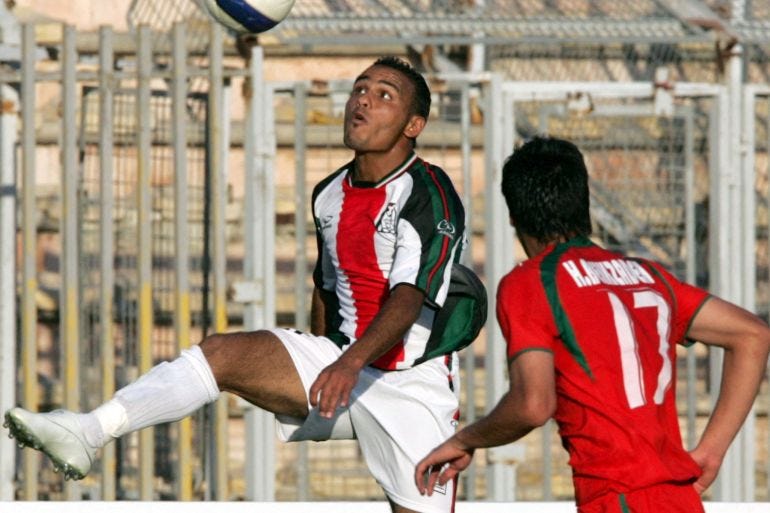
U.S. Ambassador Mike Huckabee said that GHF will expand from 4 to 16 aid sites running 24/7. (NYT)
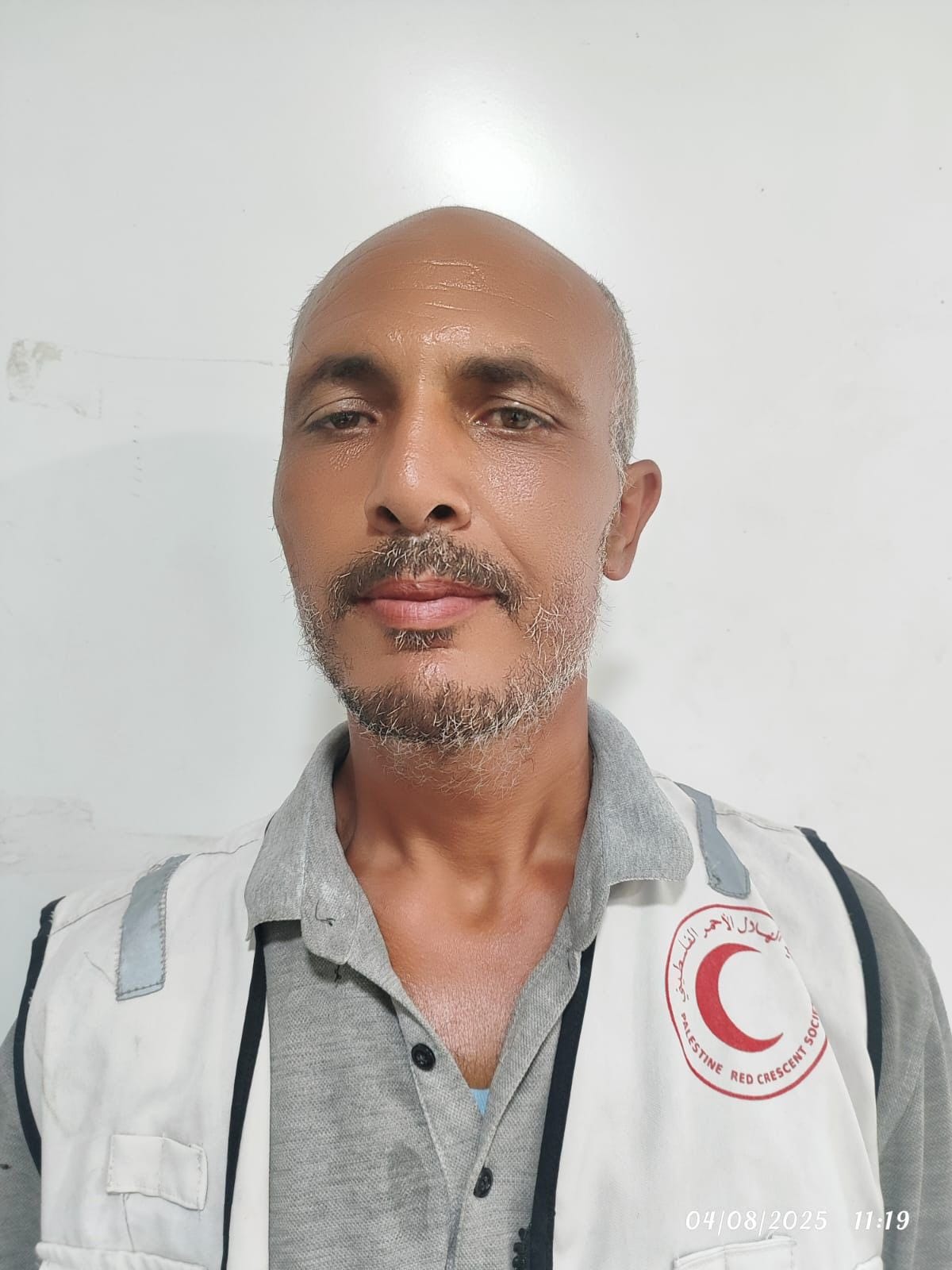
Israeli forces killed at least 38 Palestinians seeking aid, including 28 near the Morag Corridor and 10 near GHF-run sites, overnight on Tuesday and into Wednesday. (Le Monde)
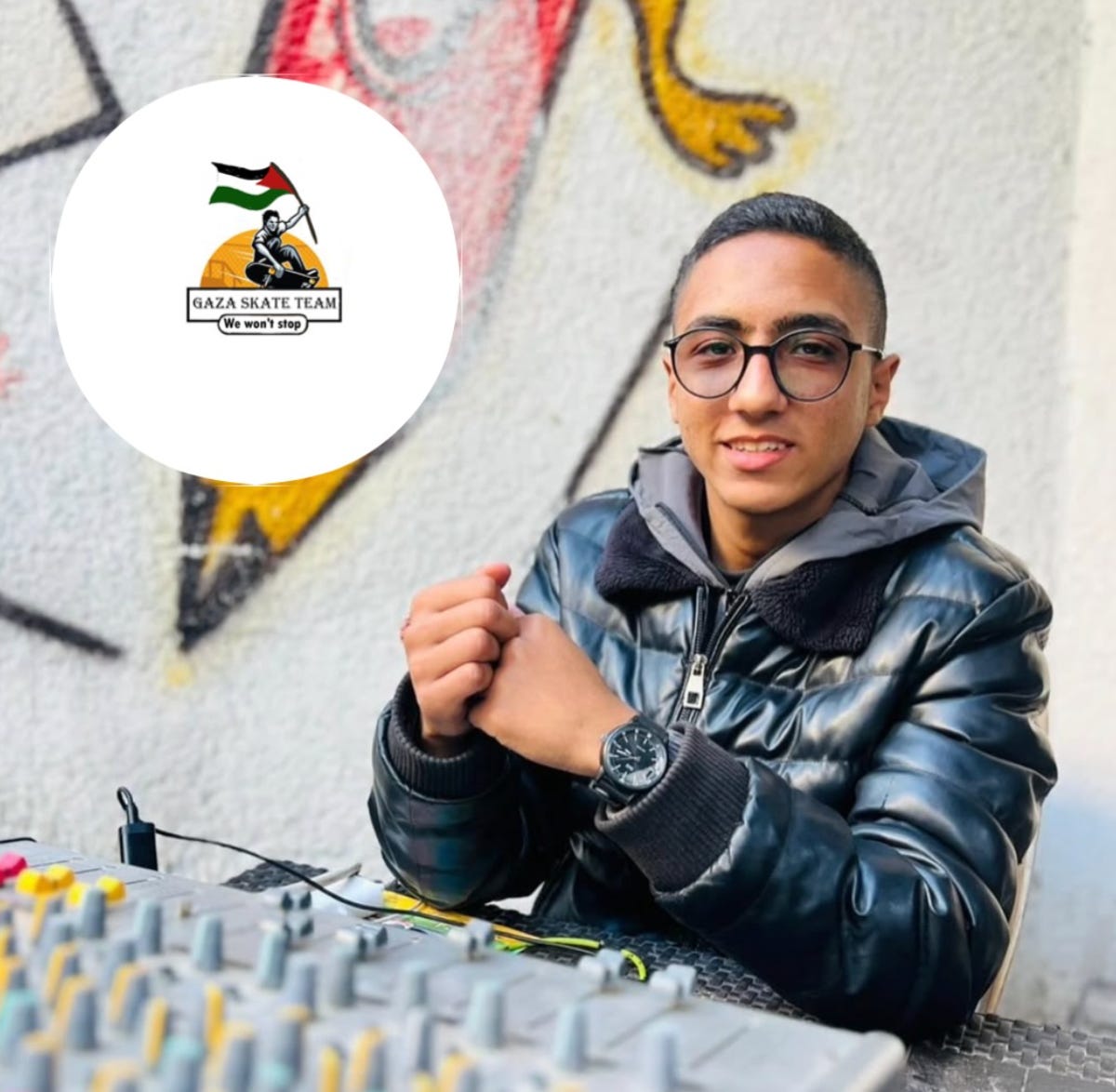
At least five Palestinians, including a 16-year-old student, have disappeared from GHF sites since June, with three confirmed to be in Israeli custody, with no access to lawyers or information on their whereabouts, and two missing entirely. (MEE)
ICYMI, I shared my thoughts on GHF’s true purpose on Breaking Points earlier this week:
Axios reports that the U.S. brokered the first meeting between senior UN aid officials and GHF chairman Johnnie Moore. No cooperation was agreed, only a pledge to stop the public feud. (Axios)
Death by Aid
Four people in Gaza have been crushed to death by airdropped aid packages, including a Gazan nurse who called the airdrops “humiliating” days earlier, and three children. Here is video of one of them. (Anadolu)
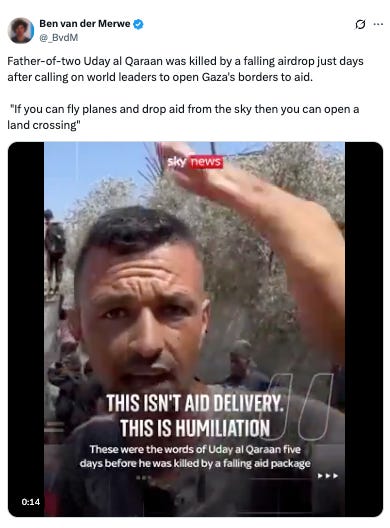
Some of the airdropped aid packages are covered in black mold. (Al Jazeera)
Settlers attacked a Jordanian aid convoy en route to Gaza, smashing windshields and halting trucks with stones for the second time in a week. (Anadolu)
A truck loaded with food aid flipped and killed 20 Palestinians in Gaza after its tires caught fire and it veered into a crowd. (Haaretz)
Almost 9 in 10 UN aid trucks have been looted before reaching their destination in Gaza over the past several months—mostly by starving civilians—highlighting how Israel’s long blockade has shattered trust in aid reliability and triggered mass desperation that didn’t exist during the January ceasefire, when supplies flowed freely. (Times of Israel)
General Annihilation
A new Human Rights Watch report found that Israel has “carried out hundreds of strikes on schools sheltering displaced Palestinians, including attacks using US munitions, that have killed hundreds of civilians and damaged or destroyed virtually all of Gaza’s schools.” In the two cases it investigated, in which strikes on schools killed 49 people, HRW found no evidence of military targets. (HRW)
Satellite imagery reveals that just 12% of Gaza is currently livable. (Le Monde)
Two senior Israeli commanders openly detailed their units’ systematic, methodical annihilation of Beit Hanoun in multiple Israeli media interviews—razing the town “down to the foundations” until “there are no standing houses to return to”—directly contradicting Netanyahu’s Fox News claim that Gaza’s destruction stems from Hamas booby traps. (Drop Site)
The UN warned that 96% of Gaza households are unable to safely access water for daily use, and toilets are inaccessible to three-quarters of the population. (OCHA)
Average water consumption in Gaza is a fraction of minimum emergency needs, and polluted aquifers are spreading disease. (Reuters)
Gaza has reported a sudden surge in Guillain-Barré Syndrome—95 new cases in one day, mostly children—linked to malnutrition and toxic water. (Haaretz)
Gaza is facing a dire blood shortage as malnutrition leaves would-be donors too weak to give, blood banks run dry, and Israeli forces continue bombing clinics and enforcing an aid blockade. (Al Jazeera)
CNN documented a Gazan mother helping her teenage daughter manage her period amid severe shortages of sanitary pads, tampons, clean water, and soap. (CNN)
Israeli Agriculture Minister Avi Dichter unveiled a plan to permanently displace Gazans abroad, claiming they would “be happy to leave” if given international support, suggesting Libya—with its “vast areas and a coastline similar to Gaza’s”—as a resettlement site. (MEM)
Israeli strikes across Gaza on Friday killed seven Palestinians, including three shot while waiting for aid in central Gaza, a married couple in Bani Suheila, and three others in separate attacks in Gaza City. (Anadolu)
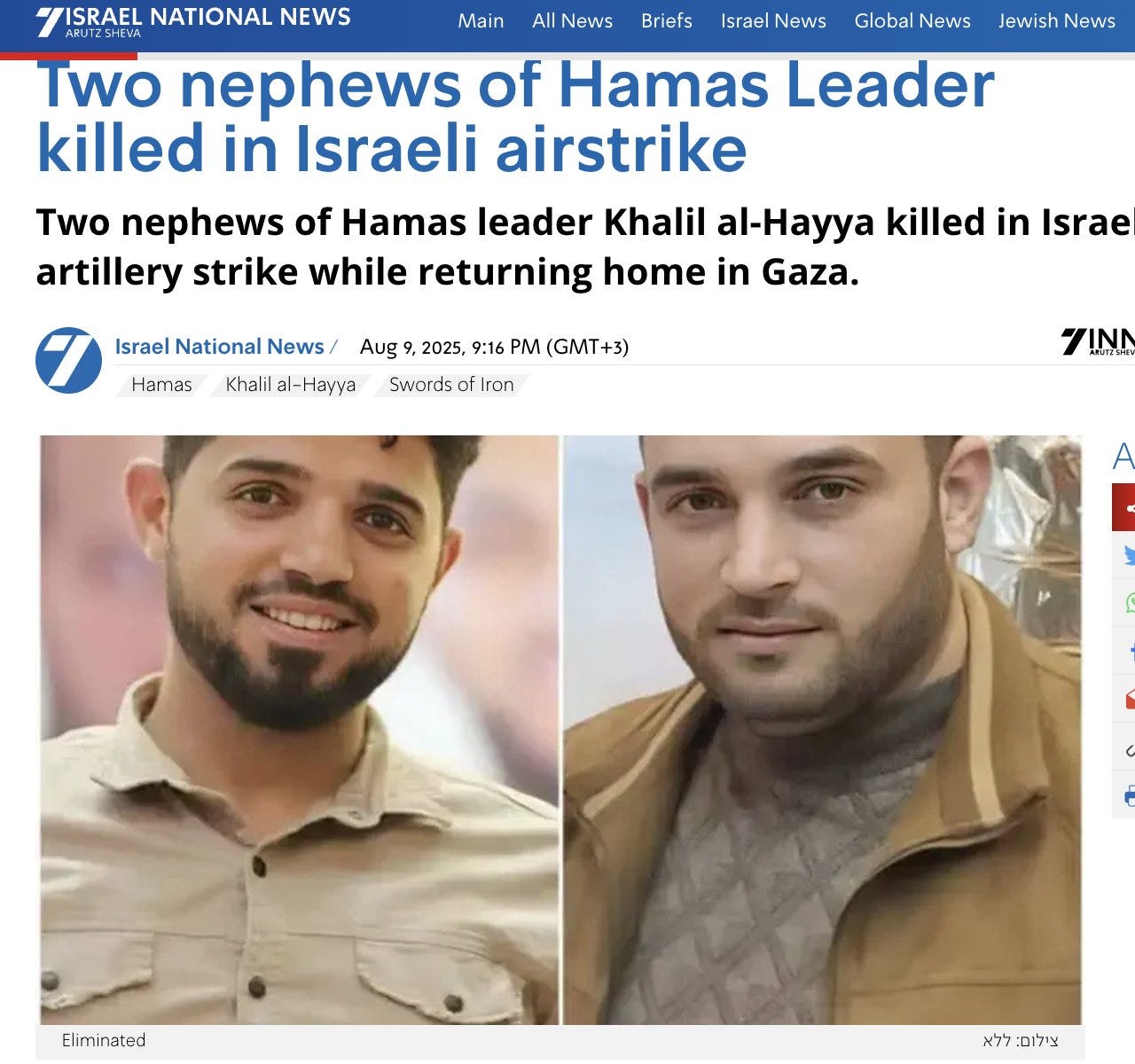
Tired of Winning
For the second time in a week and the sixth time in two years, the military announced it had “defeated” Hamas’s Beit Hanoun Battalion. (JPost)
Growing Consensus
Jeremy Ben-Ami, the president of the liberal Zionist organization J Street, wrote that he now believes Israel is committing genocide, but is unlikely to use the term because it would bring him personal pain.
Former war crimes prosecutor Graham Blewitt says the evidence of genocide in Gaza is “overwhelming,” comparing it to the Srebrenica massacre and declaring he’d have “no hesitation” indicting Israeli leaders if he were at the ICC today. (MEM)
Hamas’s Finances
BBC reports that Hamas has kept paying 30,000 Gaza civil servants through a covert cash network—handing out envelopes at secret meetups—funded from a $700 million prewar stockpile, frustrating Israeli efforts to destroy the group’s governance capabilities. (BBC)
A History of Israel’s Military Occupations of Gaza
Jacobin traced Israel’s three military occupations of Gaza, from the massacres and ethnic cleansing of 1956, to the mass displacement and decades-long rule after 1967, to today’s siege and planned reoccupation. (Jacobin)
West Bank
Murder in Umm Al-Khair
Yinon Levi, the notoriously violent settler who killed Awdah Hathaleen last Monday, returned to the village one week later to continue construction on an illegal settlement. (X)
That same day, settlers drove through the village repeatedly shouting, “He’s dead!” (X)
On Tuesday, settlers led by Levi’s brother-in-law cut another critical water pipe—the last one was destroyed by a settler’s bulldozer just before the killing—and the army has now warned they’ll cut the village’s electricity next. (X)
Israeli authorities finally released Hathaleen’s body eleven days after his death, only after his family agreed to hold the funeral in a designated area, forgo a mourning tent, and accept a military ban on non-residents, which the military then enforced with masked, armed soldiers. His mother fainted during the funeral. (Haaretz)
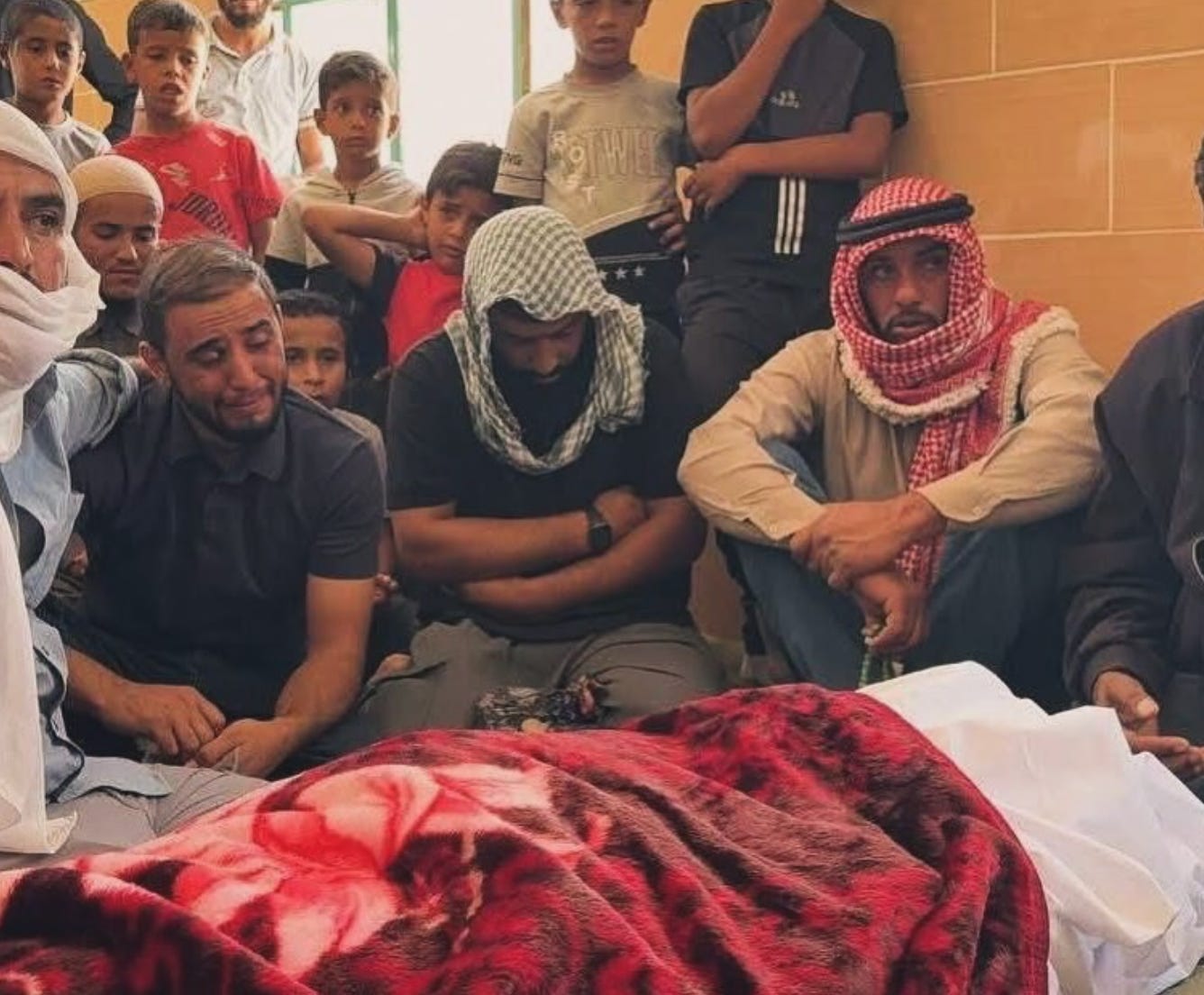
All 21 of the village’s residents who had been arrested after the shooting, including the victim’s son, have been released, showing clear signs of abuse.
Gideon Levy’s piece on the killing added damning (and utterly typical) new details: soldiers separating mothers from crying infants, leaving villagers shackled and blindfolded for 24 hours, and one wishing he’d fired the lethal shot himself.
Levy writes: “When the representative of the Israel Police was asked ... why residents of the village who defended themselves were under arrest while the person who shot at them was going to be released, the officer replied: ‘These are two different populations.’ Is there a more succinct description of apartheid?” (Haaretz)
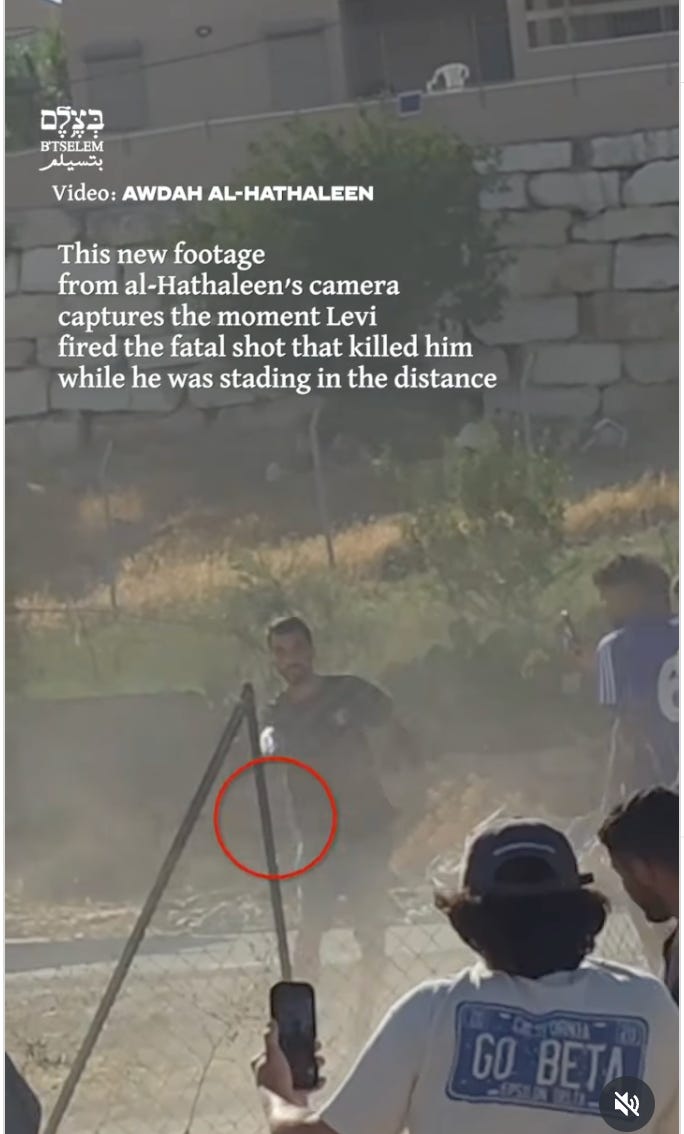
ICYMI, I wrote last week about how the Israeli government supports the West Bank’s most violent settlers: The Violent Settlers Are Just Doing Their Job.
This Week in Pogroms
Settlers assaulted three Palestinian farmers in Khallet Al-Nahleh, south of Bethlehem; invaded the Bedouin community of Khirbet Samra in the northern Jordan Valley; attacked a water spring in al-Himma, blocked livestock access, and dumped dead animals near residents’ tents; set fire to Bedouin tents in Ein Ayoub, west of Ramallah; and attacked the Kaabneh Bedouin community in al-Khalayel, northeast of Ramallah, giving residents a two-week ultimatum to leave. (Anadolu)
A “religious-rights” NGO is boasting about “breaking records” for the very act of provocation Hamas cited in naming its October 7 attack—4,045 Jews ascended the Temple Mount, home to Al-Aqsa Mosque, on Tisha B’Av, up 37% from last year, led by National Security Minister Itamar Ben-Gvir. (JNS)
A court acquitted a settler accused of joining 20 others in chasing, stoning, and tear-gassing five Bedouin Israeli women and a toddler, then torching their car. Despite undisputed evidence of the attack, the judge cited evidentiary issues and police mishandling. (Haaretz)
Settlers cut through a fence, broke a window, and torched a Palestinian farmhouse in Turmus Ayya, scrawling “Revenge” and “Price Tag” on the wall—slogans used to mark acts of retaliation against Palestinians in response to Israeli government actions perceived as limiting settlement expansion. (Haaretz)
On Monday, settlers poisoned several sheep in the Al-Auja Waterfall area, north of Jericho. (Abna)
Settlers attacked a Russian diplomatic vehicle near the illegal Giv’at Asaf settlement, damaging the car and threatening diplomats while nearby Israeli soldiers stood by. (Al Jazeera)
The Gestapo
Israeli soldiers shot and killed 25-year-old Abdallah Atiat, an Israeli citizen, while he was visiting his aunt in Jericho; the army said he had “approached troops in a suspicious manner.” (Haaretz)
Israeli soldiers in the West Bank are systematically committing straightforward cases of home invasion and armed robbery—holding families at gunpoint in one room while others ransack the house—taking gold heirlooms, children’s piggy bank savings, and family cars. (Haaretz)
Israel’s Defense Minister announced it will keep military units in the Jenin, Tulkarem, and Nur al-Shams refugee camps through 2025. (JNS)
The Annexation
House Majority Leader Mike Johnson, the second-in-line to the president, visited the Ariel settlement and declared that “the mountains of Judea and Samaria are the rightful property of the Jewish People.” (To be clear, international law is unambiguous on this matter: Israel has no claim whatsoever to the West Bank—or “Judea and Samaria”—which belongs to the Palestinians.)
He also vowed to eliminate the term “West Bank” from US federal use in favor of “Judea and Samaria,” but made no mention of the two Americans killed by settlers there in the past month, or the American child currently being held in an Israeli prison without charge. (Haaretz)
A Hebrew-only article in Israel Hayom revealed that Johnson reviewed “maps and documents” related to Israel’s plans to annex the West Bank—details omitted from the English language version, part of a consistent pattern in which damning details are left out of English translations. (Israel Hayom)
During a return to the Sa-Nur settlement dismantled in 2005, Smotrich, possibly the most powerful man in the Israeli government, posed in front of “Death to Arabs” graffiti with settler leader Yossi Dagan. (Haaretz)
Smotrich announced plans to reestablish the evacuated northern West Bank settlements of Ganim and Kadim within weeks—joining Homesh and Sa-Nur—as part of what he called “correcting the sin of expulsion” and “erasing a Palestinian state.” (INN)
Archaeological Warfare
Israel seized 40% of Sebastia’s land to pave the way for a $10 million settler-run Biblical Disneyland—“Samaria Park”—while giving cover to demolish large parts of the Palestinian village and freeze all municipal activity. If you haven’t yet read my essay on archaeology’s central role throughout the history of Zionism and the spiraling situation on the ground in Sebastia, here it is: In Ruins | Archaeological Warfare in the West Bank.
Friendly Fire
The Israeli military reported a sharp drop in “terror attacks” in the West Bank this year and a spike in settler violence. (Ynet)
Settler kids reportedly set an Israeli soldier’s car on fire after he tried to ease tensions between the army and the “hilltop youth.” (INN)
Crocodile News
Israeli authorities shot and buried over 250 crocodiles at an abandoned settler-run tourist attraction out of fear they’d escape and endanger the settlers. (Haaretz)
Israel
Response to Palestinian Statehood
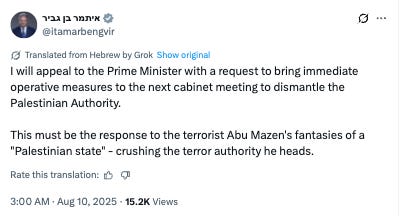
Like America, Like Israel
In a unanimous vote, Netanyahu’s cabinet ousted Attorney General Gali Baharav-Miara, his top legal foe and lead prosecutor in his corruption trial. (WaPo)
Netanyahu is considering suing The New York Times for defamation over a photo of a malnourished boy who also had cerebral palsy. (JPost)
Popular Opinion
A new poll found that 79% of Israeli Jews are “not so troubled” or “not troubled at all” by the reports of famine and suffering among the Palestinian population in Gaza. (Haaretz)
A Tel Aviv fundraiser by Israeli artists for Gaza residents was forced to relocate to a secret venue after numerous threats. (Haaretz)
An Israeli pediatrician wrote that she expected Israeli doctors to protest en masse after two major Israeli rights groups declared the Gaza war a genocide, but instead found near-total silence from the country’s medical establishment. (Haaretz)
A staffer at Israel’s top-rated Channel 12 News says he quit because he “couldn’t bear the intentional cover-up any longer,” describing a deliberate policy to air only military-approved videos while suppressing footage showing war crimes. (X)
A Haaretz editorial asked, If Netanyahu Is So Outraged by Hostage Videos, Why Doesn’t He Just Bring Them Back? (Haaretz)
Presented Without Comment
A lake in Israel turned blood red:
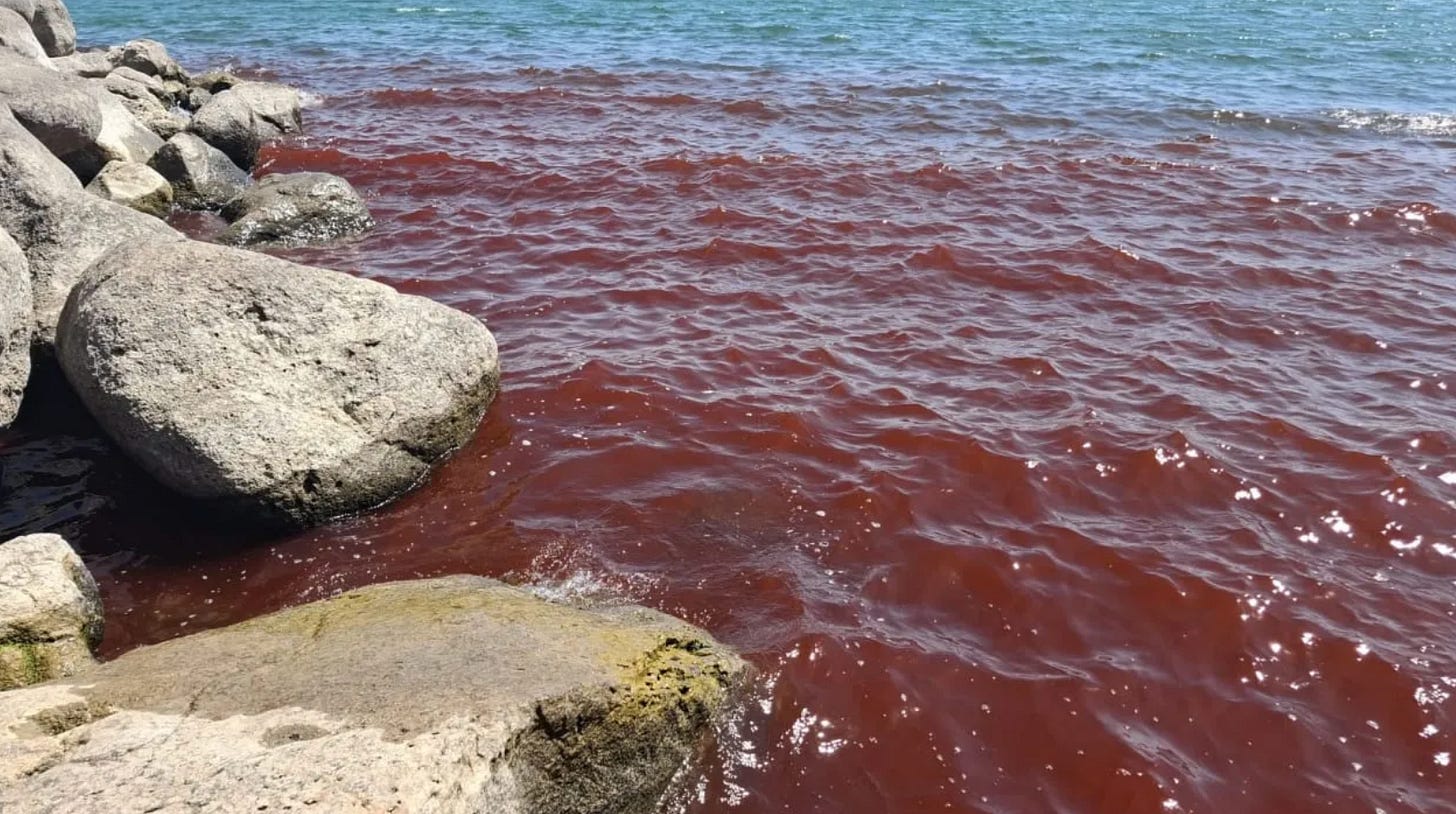
US (and World)
Dual Loyalty
The Trump administration will withhold $1.9 billion in FEMA disaster preparedness funds from states or cities that boycott Israeli companies. (Reuters)
Netanyahu rented the US House Intelligence Committee during its trip to Israel to ensure its goals are aligned with Israel’s. (Times of Israel)
VP JD Vance reiterated that America would not be recognizing a Palestinian state. (Al Jazeera)
Sarah Huckabee Sanders, the governor of the seventh poorest state in the US, visited Israel and the West Bank. (JNS)
Dead Americans
Asked whether the US would press Israel to investigate the latest American killed by a settler, State Department Spox Tammy Bruce said, “It’s a violent situation. There have been a few Americans who have passed in this kind of dynamic.”
She added that Israel would be conducting its own investigation and that “We are on that and every other situation that has impacted an American citizen wherever they may be in the world.” (X)
Economy of Genocide
Boston Consulting Group modeled a mass relocation plan for Gazans on behalf of Israeli businessmen to places like Somalia and Somaliland, estimating costs and potential ROI for developing Gaza into a tourism and manufacturing hub. (FT)
Microsoft built a custom Azure cloud for Israel’s Unit 8200, the country’s NSA equivalent, to store audio from millions of intercepted Palestinian phone calls—data used to plan airstrikes, justify arrests, and expand Israel’s surveillance dragnet across Gaza and the West Bank (+972)
Censorship
The Trump administration is rewriting the State Department’s annual human rights reports to erase or downplay abuses by allies like Israel, El Salvador, and Russia—cutting the Israel report from 100 pages to 25, scrubbing references to Netanyahu’s corruption trial, Israeli surveillance of Palestinians, and movement restrictions. (WaPo)
Trump demanded $1 billion from the University of California over UCLA’s handling of 2024 pro-Palestinian protests. (Le Monde)
Columbia University secretly overhauled its disciplinary system to punish pro-Palestine protesters in line with Trump administration demands. (Intercept)
Layla Saliba, a pro-Palestine student activist at Columbia, wrote about what she’ll remember from her Ivy League experience: “I am constantly reminded that my existence creates a hostile environment for others, that I do not belong here.” (Columbia Spectator)
Mahmoud Khalil’s Story
In an interview with Ezra Klein, Mahmoud Khalil traced his journey from a Palestinian refugee camp in Syria, where his family settled after the Nakba, to becoming a Columbia protest leader and eventually an ICE detainee. He described how his view of Jewish people shifted from the Palestinian experience of knowing only “the one who’s trying to kill you” to forming close bonds with Jewish Voice for Peace activists. He also explained why he refuses to answer the “dehumanizing” question of whether he condemns Hamas, which he sees as a test of whether Palestinians are “worthy of listening to,” and recounted listening to his wife give birth from an ICE detention cell. (NYT)
Baby Steps
House Democrats are ramping up a new push to recognize a Palestinian state, with over a dozen signing a letter to Trump and Rubio—nearly triple last year’s support. (Axios)
Marjorie Taylor Greene accused AIPAC of breaking U.S. laws by funding congressional trips to Israel and demanded that it register as a foreign lobbyist. (TNR)
Targeting the Watchdogs
Le Monde reports that the U.S., Israel, and several European allies have waged a coordinated campaign of threats, sanctions, espionage, and political sabotage to derail the ICC’s investigation into Israeli war crimes and cancel arrest warrants against Netanyahu and other officials. (Le Monde)
Disgracing the ADL
ADL chief Jonathan Greenblatt expressed concern about rising “intermarriage rates” among Jews. (X)
New York Magazine traced how the ADL, once a civil rights leader that marched with MLK and fought segregation, abandoned the issues it once championed to become Israel’s most fervent defender. (NY Mag)
In a Times interview, Jonathan Greenblatt said he had never read the legal definition of “genocide,” despite years of labeling the accusation against Israel as antisemitic. Watch his face as he listens to the definition right after agreeing that his job requires “clarity on the use of words”:
I had to cut the video into two clips because it was interrupted by an advertisement for atrocity denial:
Here’s part two:
He also advanced the conspiracy theory that Students for Justice in Palestine had prior knowledge of the October 7 attack—intelligence even Iran and Hezbollah lacked. He rejected the idea that anti-Zionism is growing among young Jewish Americans, likening them instead to “Blacks for Trump,” and praised the Trump administration’s antisemitism strategy, adding that, of course, he would object if it were ever used as a “political football.” (NYT)
Terror in the UK
Three protesters were charged under the UK’s Terrorism Act for displaying signs in support of Palestine Action, marking the first prosecutions since the group was banned last month for damaging military jets at an RAF base. (Guardian)
Vaguely Relevant Pierogi News
Alan Dershowitz was escorted from a Martha’s Vineyard farmers market twice after picking a fight with a vendor who refused to sell him pierogis over his defense of Epstein and Trump. Dershowitz called it “pure McCarthyism,” threatened legal action, and returned days later with a signed copy of his book Ten Big Anti-Israel Lies. (Defector)
Thanks for reading. As always, I welcome your thoughts, questions, etc. in the comments.
And if you’ve made it this far and can afford it, consider upgrading to a paid subscription.

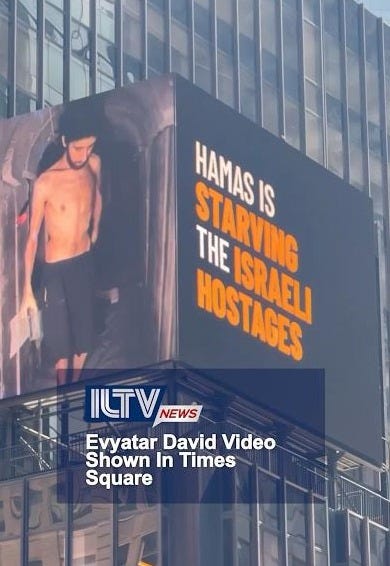
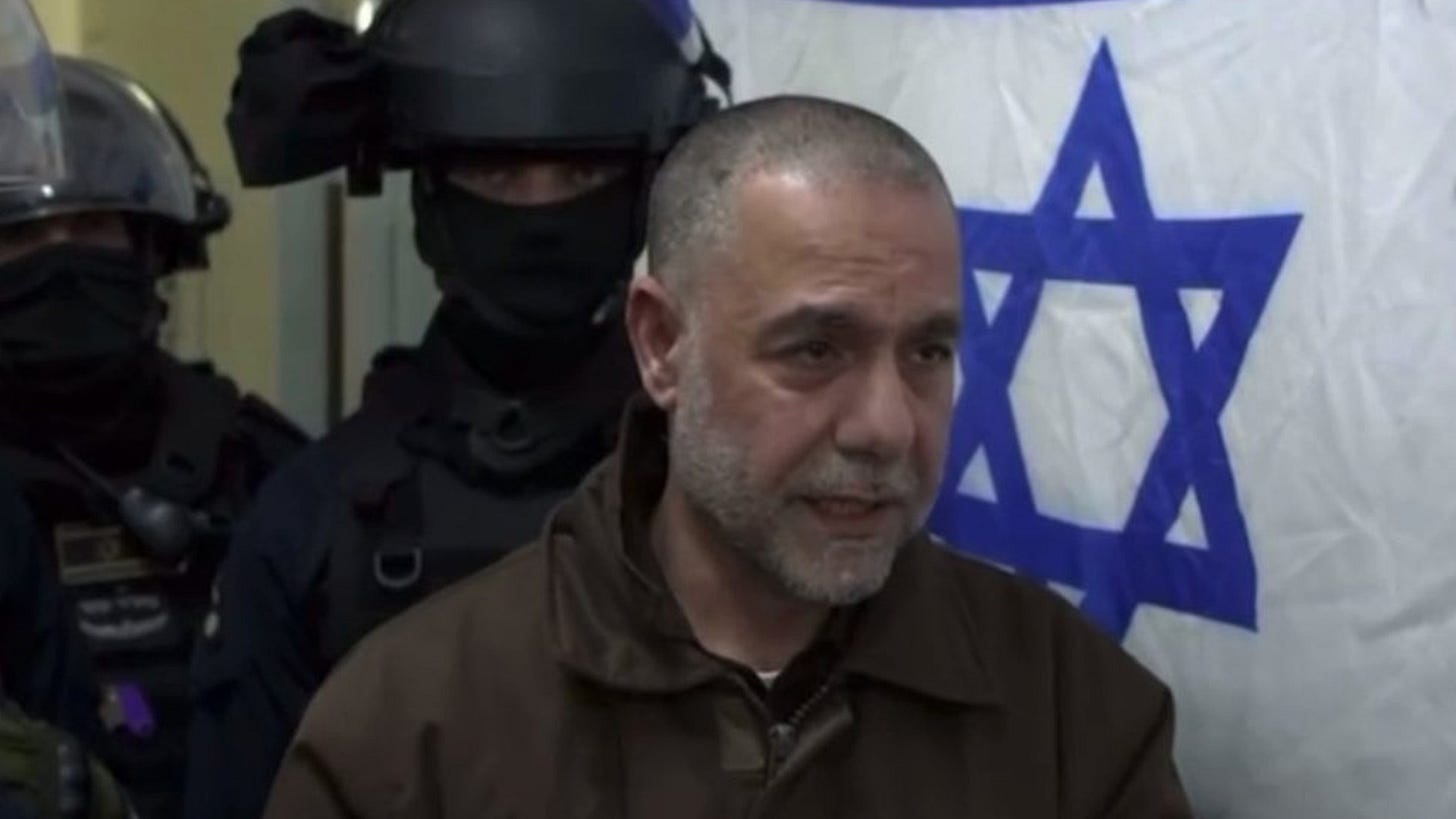

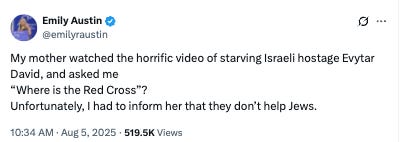
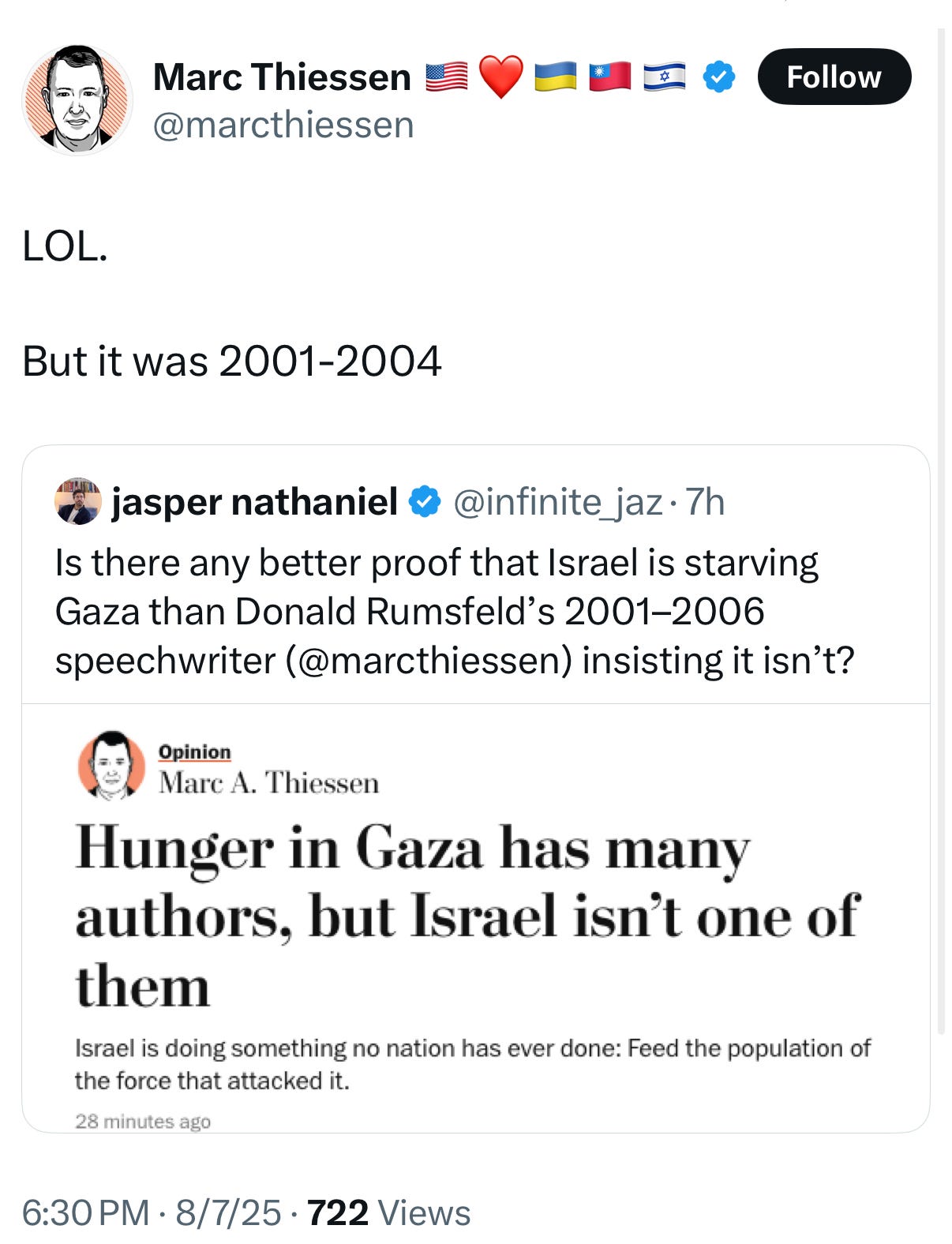
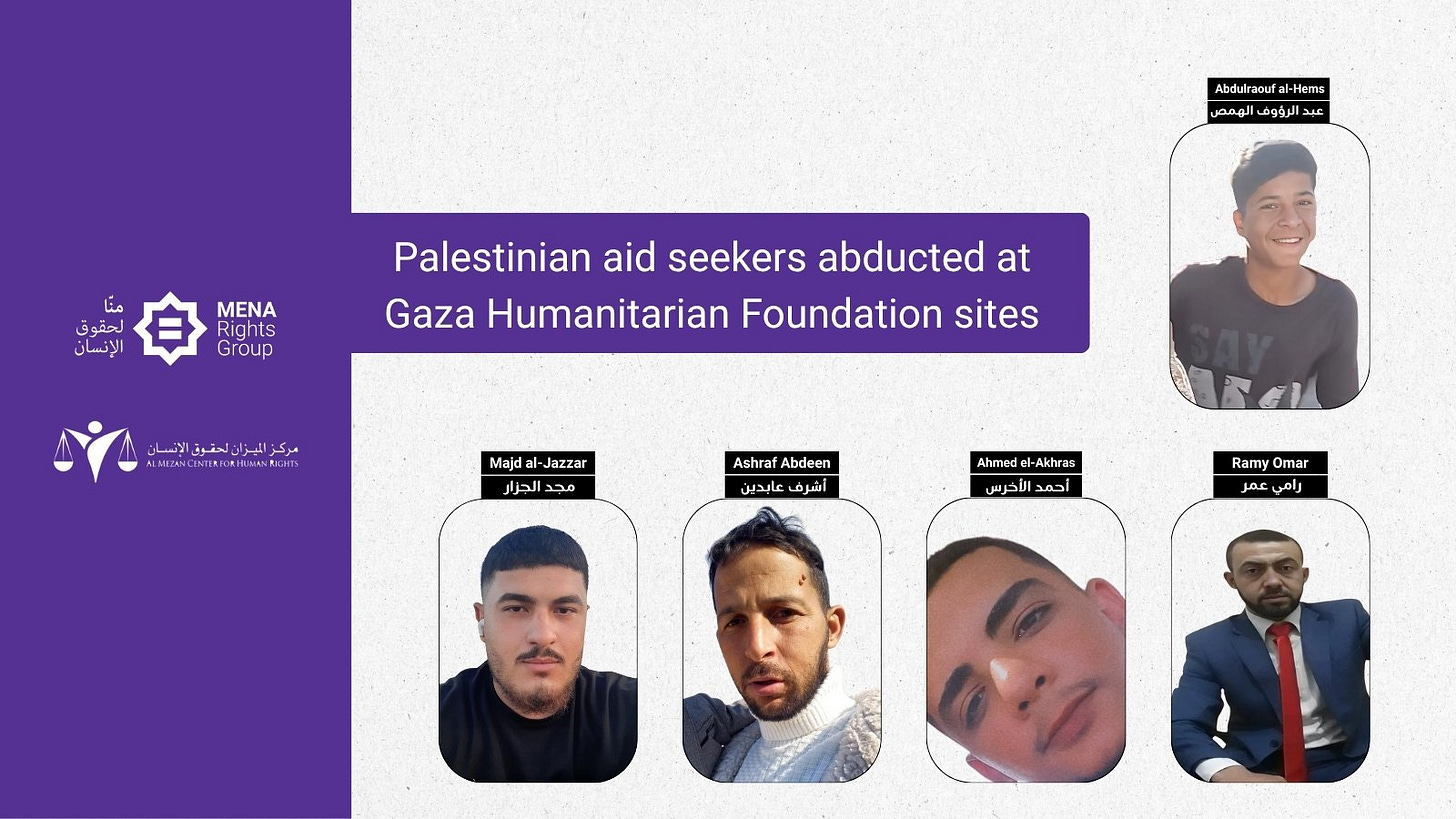
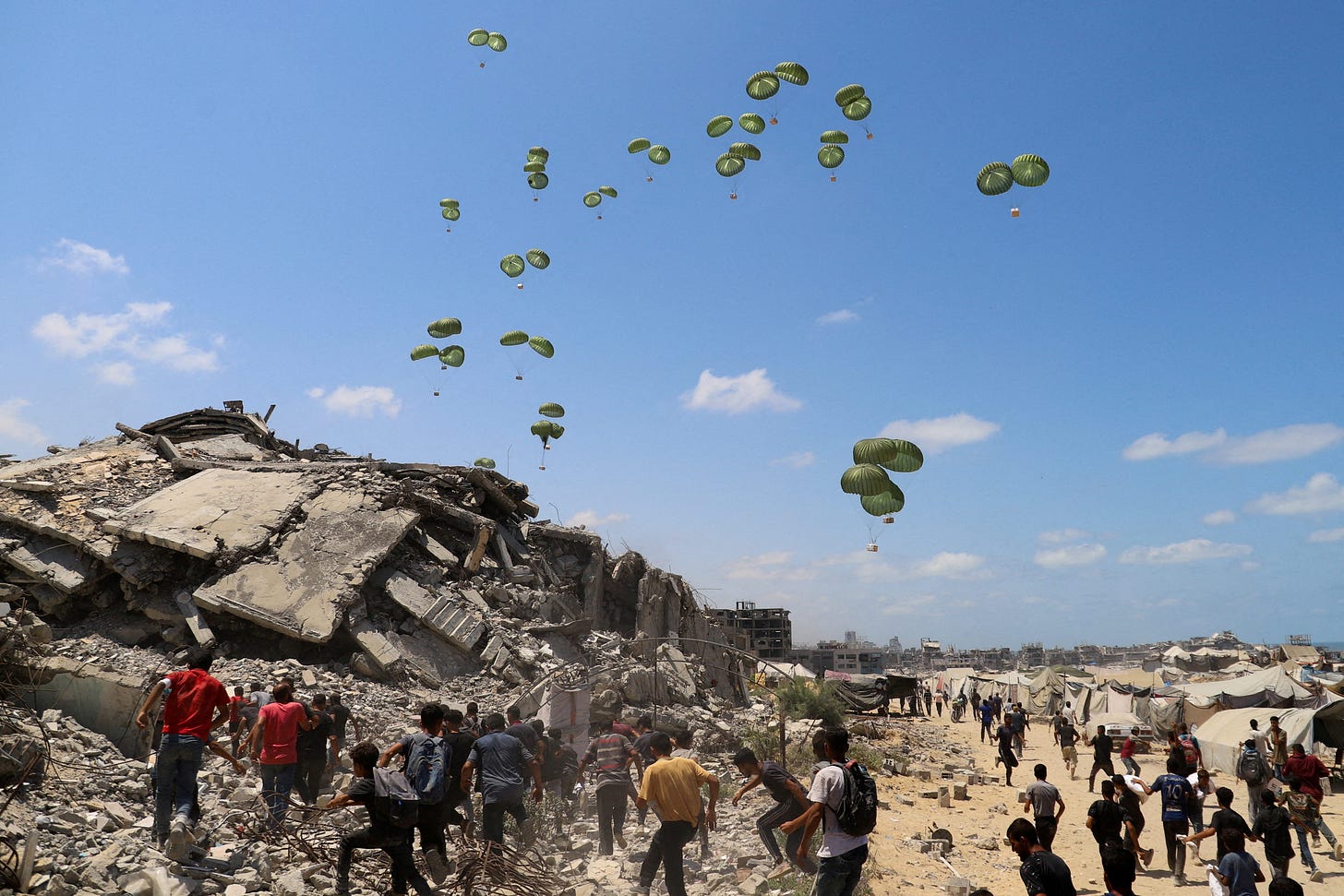

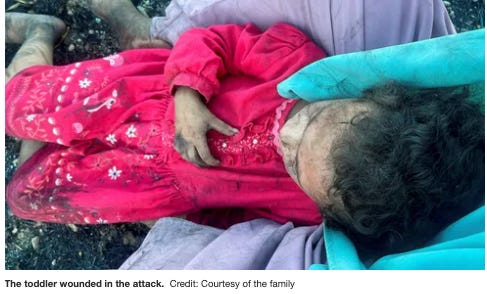
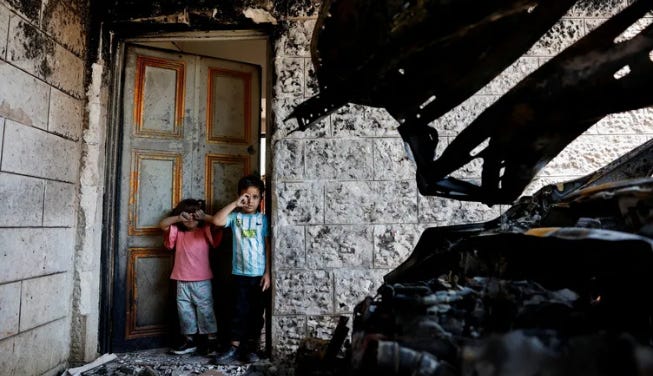


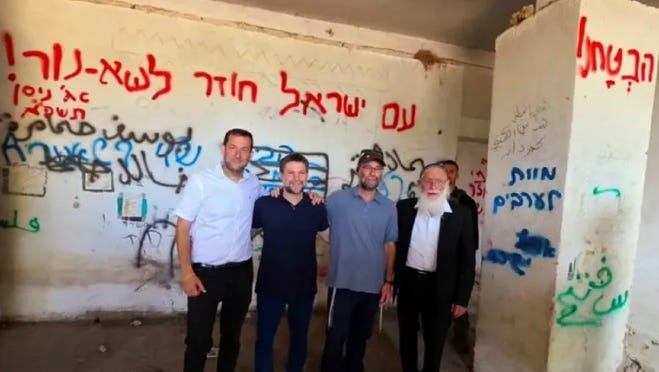
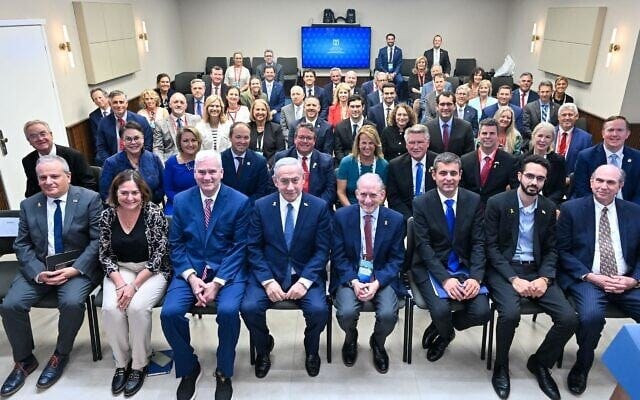


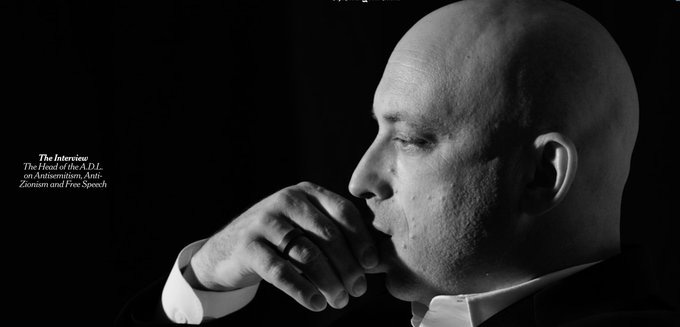

Although reading your ever expanding reports makes me sick and depressed, I hope you will continue what may be a recipe for your own detention. Stay safe but keep up the good work.
I'm going to nerd out a bit here. Sorry! I studied linguistics & did my master thesis on language & meaning using George Lakoff's ideas. He talks about frames, metaphors & conceptual systems. It's based on a wider concept in cognitive linguistics - entrenchment - the double standard is SO baked in b/c of the decades long repetition of certain word pairings that it becomes automatic & feels natural. Prisoners in this context fits neatly into a legal framework while hostages evokes the whole innocent victim taken captive by barbarians narrative.
Words are never just words. They activate emotions, entire storylines. Even those of us aware of the power assymetry sometimes default to using the same words. Even I catch myself saying Israeli hostages even though I'm fully aware of the propaganda & biases. It sounds like I momentarily forget that the law was written by the jailers & their 'prisoners' are actually hostages. But I didn't forget. Just that the mental framing is that entrenched & it reveals the power of language & propaganda. That's partly b/c language changes much more slowly than perception or narrative. So I agree with you in that the linguistic double standards has played a central role in shaping the discourse. It's decades of conditioning.
The good news is that the global consensus has significantly shifted in the last two years. People are now calling out these mental frames & not simply swapping words b/c that's not enough, since one of the downsides of language is that words and phrases can become so automated that we can use them without conscious thought. But the larger narrative built on power assymetry is being called into question and reframed👏👏